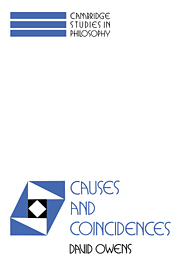Book contents
- Frontmatter
- Contents
- Preface
- Introduction
- 1 THE INEXPLICABILITY OF A COINCIDENCE
- 2 CAUSES AND LAWS
- 3 EVENTS AND NON–CAUSAL EXPLANATIONS
- 4 CAUSAL EXPLANATION
- 5 THE DIRECTION OF CAUSAL EXPLANATION
- 6 LEVELS OF CAUSATION
- 7 DEVIANT CAUSAL CHAINS
- 8 CAUSATION IN ACTION
- Conclusion: WHITHER CAUSAL REALISM?
- Bibliography
- Index
- Frontmatter
- Contents
- Preface
- Introduction
- 1 THE INEXPLICABILITY OF A COINCIDENCE
- 2 CAUSES AND LAWS
- 3 EVENTS AND NON–CAUSAL EXPLANATIONS
- 4 CAUSAL EXPLANATION
- 5 THE DIRECTION OF CAUSAL EXPLANATION
- 6 LEVELS OF CAUSATION
- 7 DEVIANT CAUSAL CHAINS
- 8 CAUSATION IN ACTION
- Conclusion: WHITHER CAUSAL REALISM?
- Bibliography
- Index
Summary
In chapter 1, I took causation for granted. A coincidence was defined as an event naturally divisible into two parts with independent causal histories. So ‘cause’ was used to analyse ‘coincidence’. Given this, ‘cause’ appears the more fundamental notion and the analysis of causation must proceed without regard to the explicability of a coincidence. Of course, the inexplicability of a coincidence sets a limit on causal explanation – if coincidences cannot be explained, they cannot be explained causally either. But this may have more to do with the nature of explanation than with that of causation.
Such reflections led me to think that causation must be firmly distinguished from causal explanation: coincidences have no causal explanation, nevertheless they are caused (Owens, 1989b :71–2). This reaction sits well with the work of philosophers such as Davidson and Lewis who have their own reasons for distinguishing causation from causal explanation and for analysing the causal relation, if at all, without reference to explanation. I now think that this reaction was misguided: causation should be tied to causal explanation (Sorabji, 1980:11). In fact the following is my analysis of causation: a cause is an event which ensures that its effects are no coincidence.
I arrived at this conclusion by considering two problems which confront all analysts of causation. First, some way must be found of distinguishing causal explanations from the awkwardly similar but importantly different quasi-logical explanations to be considered in chapters 3 and 4. No analysis which fails in this task can be deemed adequate.
- Type
- Chapter
- Information
- Causes and Coincidences , pp. 23 - 40Publisher: Cambridge University PressPrint publication year: 1992

